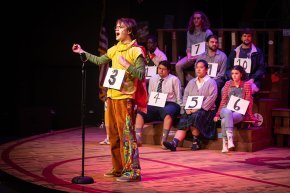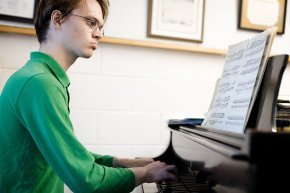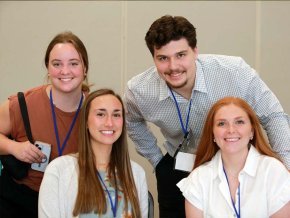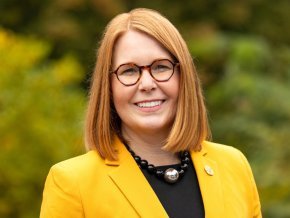
We are thoughtful
For a few weeks in the 2022-23 school year, little origami octopuses would appear on windowsills, desks, bookshelves around campus to add a little brightness to a passing student’s day.

These colorful bits of folded paper were likely the work of Dan Paradis ’25 – an economics major with a passion for singing and piano – who shows how the analytical can blend with the artistic into a balanced and satisfying college experience.
“I like having a creative outlet. I used to paint, as well, and I like crafts. I wanted to learn about origami, so I watched a YouTube tutorial showing how to fold an octopus. It took me almost four years to figure it out,” Paradis shared. “I eventually got it and made a lot of them. I put a few around campus, but it takes about two hours to make one, so instead I made a bunch of cranes as a promotion for the debate team.”
While Paradis has little interest in designing origami himself, he expressed admiration for former NASA physicist Robert Lang, whose original designs are the stuff of legend – and New Yorker articles.
“You can get crease patterns for his work online, but then you have to buy an expensive book to learn how to interpret them,” said Paradis, showing his balanced approach to the world. “The businessman in me admires that, but the college student can’t justify the expense. Maybe one day, but not yet.”
The musician
Paradis’ true creative love is music. He started playing piano at age 15 after he noticed another student improvising a tune on the piano before a high school choir class.

“I got a later start than most people, who start lessons when they’re very young, like four or five,” he said. “It took a lot of time to convince my parents that I was serious about it, but I actually came to LR with plans to minor in piano.”
Then Paradis joined the A Cappella Choir – singing in an ensemble for the first time since ninth grade – and his musical focus shifted. He still plays the piano, but the addition of voice into the mix moved him to a more generalized music minor.
“Minoring in music has really opened up my life at LR,” he said. “Most of the people I socialize with are in music, and I’ve enjoyed singing as much as I enjoy piano. If I didn’t have the music minor I’d probably just go home and watch YouTube or play video games. Music has enriched my life so much.”
The businessman
As much as Paradis enjoys music – he’s speculated that his dream career would be singing opera – he is also a practical soul with diverse interests, including economics and finance.
“The thing about the arts is the talent threshold for making a living in that area is very high, especially in the age of social media,” he observed. “Even if you meet that threshold, your chances of having a career you can live on are very low.”
With a mother who majored in mathematics in college and a father who works in Treasury services sales for a bank, Paradis has been immersed in economics and logical reasoning all his life.
“My dad talked to me about economic concepts from a young age, and I’ve always enjoyed the subject. Because of the way it’s presented in the media, a lot of people don’t understand economics. It’s called ‘the dismal science’ and presented as this dry topic, but it’s not dry. It’s just practical, and it applies to almost every part of life.”
Paradis plans to take his bachelor’s degree in economics, with minors in both music and finance, to law school, where he will specialize in real estate law.
“I’ve always been interested in the buying and selling of property, partly because land is one of the only investments you can make that will always have value, wherever it is,” he said.
However, value is a term that encompasses many definitions, something Paradis has learned from his grandfather, Dan Lincoln Morrill, Ph.D., who taught history at the University of North Carolina at Charlotte for 50 years and passed along more than a name to his grandson.

“He’s an avid historic preservationist,” Paradis explained. “I’ve seen him deal with a lot of developers who want to buy a historic site and turn it into a subdivision. As a real estate lawyer, I’d like to help people like my grandfather who see property in a more complex way. So, the question we have to ask is how do we use land and properties in a sensible way that balances preservation and profit?”
This idea of balance brings Paradis back to the appeal of economics.
“I try to avoid idealism, but at the same time, I understand the sentiment that drives idealism. We want to make the world a better place, but we have to think about going about that in a practical way because our actions have second and third order consequences – economics helps us think about those practicalities. I tend to favor slow, measured action. There has to be balance.”

Lenoir-Rhyne University students showcased their academic excellence and research expertise at the 2025 North Carolina Academy of Science (NCAS) annual meeting in late March.
View More
Lenoir-Rhyne University has selected Summer McGee, Ph.D, as the institution’s 13th president. Her appointment was enthusiastically approved by the Lenoir-Rhyne Board of Trustees after a national search.
View More